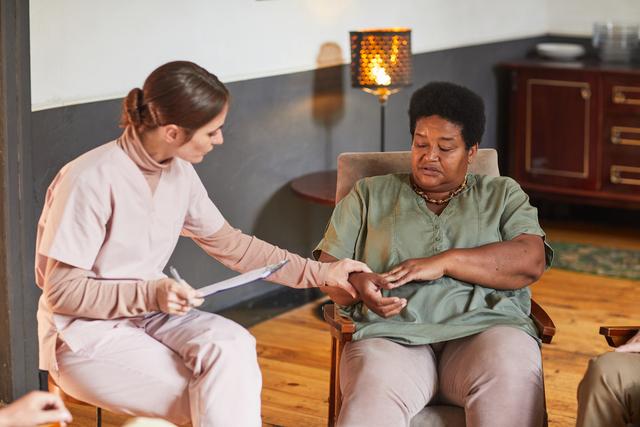Assisted Living•Health and Care Needs•Senior Living
Aging Parents: When It’s Time to Consider Assisted Living
Assisted Living•Health and Care Needs•Senior Living
Aging Parents: When It’s Time to Consider Assisted Living
Senior Living Communities and Assisted Living Communities Improve the Lives of Seniors
The decision to move a loved one to assisted living can be difficult. Still, certain factors can help you determine whether your loved one can live independently or need supervision and assistance. Understanding what care they need may help you to see how assisted living can improve a senior's life. To begin your search early, go to this link: Start Your Search on Purple Door
Activities of Daily Living (ADLs)
If your loved one has difficulty with the following activities, it may be time to consider assisted living. These simple tasks can become more complex and even dangerous as we age. We do these tasks daily without thinking about them, like getting dressed, bathing, brushing our teeth, and combing our hair.
What are the Activities of Daily Living in Assisted Living Facilities?
The National Institute on Aging defines them as “the basic activities people do daily without assistance.”
These include:
- Bathing
- Dressing
- Eating
- Toileting
- Transferring (in and out of a bed or chair)
- Continence (control bowels and bladder)
If your loved one has difficulty with two or more of these activities, they may need help with daily living tasks. Assisted living can provide the necessary care and assistance to perform these activities safely.
Significant Clues for Moving into an Assisted Living Community
Medication Management:
Taking prescribed medication is a health matter; not remembering to take medications indicates that an aging person needs assistance. It is not uncommon for a senior to be unaware of their inability to manage medication. As a loved one, ask yourself if you are managing this for them (for example, organizing their pills every weekend, setting alarms on their phones as reminders, or even calling to remind them of medication times). Medication management is a standard care need that assisted living can provide help with, and a lack of ability to manage them is the first sign that assisted living is needed.
Consider this: What would happen to the senior if you were somehow in an accident and incapable of communicating? Would the senior be at risk if they had to manage their medications without you? Ask your senior if they know the names of the drugs they are taking, why they are taking them, and how often. If they answer no to any one of these questions, they need assistance. Also, consider researching a pharmacy that will offer salad packaging for medication. Here is an article to help you understand medication management and the options of blister packaging.

Let's Dive in a Little Deeper
Hygiene
Visitors and families easily notice hygiene, such as bathing, wearing clean clothes, brushing their hair, or brushing their teeth. When these functions are neglected (whether due to difficulty or forgetfulness), it becomes apparent that the aging person in your life needs personal care services.

Mobility
Arthritis and joint pain (as well as other medical conditions) can affect mobility. With decreased mobility comes an increase in injuries and a decrease in the ability to perform daily tasks required for independent living, such as getting in and out of the bathtub or shower safely, cleaning, reaching things, taking out the garbage, and other activities needed in home upkeep.
When mobility prevents seniors from doing things, being in a community and environment that can help with these tasks makes daily life easier and safer. If your loved one is having difficulty walking, this can signify they need assisted living services.

Safety
If you, as a loved one, are concerned about the safety of your aging family or friend, it is probably time for assisted living or some level of care. Safety issues can range from your senior potentially falling and hurting themselves to forgetting things, such as leaving appliances on or burning candles, or going on a walk and becoming lost or disoriented.
Assisted living falls are something caregivers are always on the alert to prevent with older adults. Although assisted living staff can't always stop falls, they can help recognize potential fall risks.
Safety includes both physical and mental well-being; if your senior’s well-being in either department is compromised to the point that you are concerned, it is likely time to start considering options for assisted living.

Forgetfulness is Increasing
Cognitive decline is expected in seniors. Understanding the difference between Dementia and Alzheimer's or just forgetfulness is essential. When forgetfulness becomes a health and safety concern, it may be time to consider memory care or an assisted living facility with a memory care community for ease of transition. It's important to acknowledge when it's time to move
To understand better the difference between plain forgetfulness and cognitive decline such as Dementia, see the National Institute on Aging.
Loss of a Spouse
The loss of a spouse or partner significantly shifts the daily lives of seniors. Living alone can cause isolation, which has mental and physical health ramifications, mainly if the surviving spouse depends on their lost loved one for daily activities and care.
While grieving the loss of a loved one takes time, grief counseling can offer support for the surviving spouse and family members. Many say you never get over the loss of a loved one, life generally starts readjusting after six months, and that could be an excellent time to begin discussing a change of living arrangements, as long as the health and safety of your loved one is not an issue of immediate concern. Many assisted living communities offer grief support groups for their assisted living residents.
Moving to a senior living community that offers care, socialization, and counseling may be beneficial, as it can be a positive change into a new phase of life without a spouse. See WebMD for more information about grief counseling and how it could help your senior during this transition.
Caregiver Burnout
As our loved ones age, family and friends often take on caregiving responsibilities. We want to ensure our loved ones are well cared for, healthy, safe, and happy; we want to care for them and spend time with them. However, everyone needs balance in their lives, so when caregivers take on too much responsibility, it can create stress and fatigue and interfere with their day-to-day life, relationships, and well-being. This is called caregiver burnout, and if you notice yourself experiencing it, it may be time to look for assisted living or additional care for your senior. As the flight attendant reminds you on every flight, you must put your oxygen mask on first before helping other people.
You can only be an excellent, loving caregiver if you take care of yourself first. To learn more about caregiver burnout, see Cleveland Clinic.

Your Gut Instinct About Moving into an Assisted Living Facility
Sometimes, it’s just in your gut. As you read the first seven signs of needing assisted living, they may seem somewhat accurate for your situation, and sometimes, a handful of more minor things tip the scale. It may just be what you know is suitable for the loved one in your life, especially as you look toward the future and what the aging journey will bring.
If you are considering assisted living, it is most likely time because if it’s not necessary now, it likely will be soon. Finding and moving into assisted living can be lengthy, so if your gut is telling you it’s time to start looking, it’s best to start looking, even if you’re not sure your senior is in blatant need of assisted living.
Difficult Decision
Moving family members or older adults into assisted living can be tricky—just deciding to start can take incredible strength and honesty, both with your senior and yourself. It's important that you start the discussion as early as possible to ease the transition into assisted living.
Remember, There is Hope
Hopefully, this article helped you clarify when it's the right time to start considering moving from an independent home to assisted living options. Finding an assisted living community takes time, but deciding when it's the right time is the most challenging part. Consider starting your search early. Don't wait for a medical crisis: Search on Purple Door
_________________________
This article is intended solely for informational purposes and should not be construed as medical, legal, or financial advice. It does not establish a professional relationship between Purple Door Finders and the user. For any personal matters or decision-making, it is strongly recommended to seek guidance from a qualified healthcare provider, attorney, or financial advisor. While links to third-party websites are provided for your convenience, please be aware that Purple Door Finders neither endorses nor assumes responsibility for the content of these external sites.
FAQ
Is assisted living considered a long-term care facility?
Assisted living is one of 3 types of long-term care facilities. The other two types are nursing homes and skilled nursing facilities. These three types of long-term care facilities offer many medical and personal care services. The residents are people who are no longer able to live independently.
Are there different levels of assisted living?
The term levels in assisted living typically refer to levels of care, which measures the amount of time needed for staff to assist a resident with their health and care needs. The amount of time spent will determine the level and associated fees charged for the services. Each community decides how many levels of care they will offer to their residents. As a result, some assisted living communities to provide higher levels of care than others.
How to get parents into assisted living?
Number one is to start the conversation BEFORE a crisis happens. Help your parents understand you are only doing research, and if they find a property early, it puts them ahead of the game if things were to change in their lives. Most communities will allow you to place a deposit and go on a waiting list until you're ready. This will put you in control. Be patient. Listen to their concerns. Don't rush them.
When to move your parent to assisted living?
The best scenario is finding a community and getting them settled into place before a health crisis arises. When an emergency happens, the decision needs to be made immediately, and the community of their choice may not have any availability. This could then possibly force your parent to move to a community that does not meet all of their needs in the long run. The goal should always be to get them in place for the continuum of care to avoid additional moves.
How to convince a parent to go to assisted living?
The best thing to do is start the conversation BEFORE a crisis happens. Help your parents understand you are only doing research, and if they find a property early, it puts them ahead of the game if things were to change in their lives. Most communities will allow you to place a deposit and go on a waiting list until you're ready. This will put you in control.




